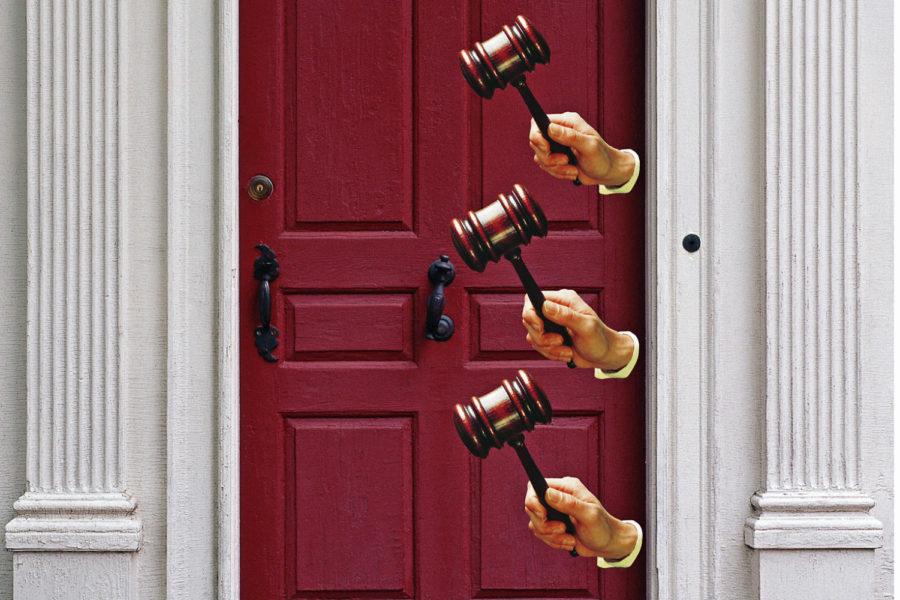Stoffa: I cannot believe how dumb this ruling is
Illustration: Rebekka Brown/Iowa State Daily
Columnist Stoffa believes a recent Indiana Supreme Court ruling could endanger Americans’ Fourth Amendment rights.
May 18, 2011
Allow me to share an excerpt from the majority opinion in the case of Barnes v. State of Indiana:
“… a right to resist an unlawful police entry into a home is against public policy and is incompatible with modern Fourth Amendment jurisprudence.”
That May 12 ruling by the Indiana Supreme Court should be reverberating in your mind, as it portends a spree of idiocy by those in high places.
What this ruling means is that police can enter your home without a search warrant and arrest you.
In the incident that provoked this legal battle, police responded to a call about a domestic dispute. Police arrived at Barnes’ home and asked if they could enter. Barnes said no, but the police entered anyway. Once they were inside, Barnes shoved an officer against the wall. He was then tased and arrested, according to police reports.
Granted, you shouldn’t go around shoving police officers. But by the same token, they shouldn’t enter your home without permission.
In the U.S. Supreme Court ruling Miller v. United States, it was held that someone “could not lawfully be arrested in his home by officers breaking in without first giving him notice of their authority and purpose.” Barnes wasn’t given that notice.
Some have argued that, in a domestic dispute, it’s an officer’s perogative to enter a home. This is an interesting argument, but one that has little bearing on Barnes’ situation because no domestic violence charges were filed. In light of this fact, the case should have been tossed.
The decision emboldened Newton County Sheriff Don Hartman Sr. to say say that random house searches are now possible. He added that he felt people would accept random searches if it means capturing a criminal.
This is simply ridiculous. No matter what policymakers say, giving arrest-hungry police the freedom to invade your privacy is lunacy.
Imagine police sauntering in and searching your home because there was a carjacking prevented in the area, and the jacker was seen running though your neighborhood. Personally, I am not OK with that idea.
Privacy? You don’t need no stinkin’ privacy. The government knows what is best for you. You have nothing to fear if you are following the law. Of course no one will judge you for things they find. Your government should make the decision for you. Now close your eyes and just let it happen.
Frightening imagery, I know, but that is the path that the Barnes decision could take us down.
Thankfully, this is probably not an idea that will be applied nationwide. But given the recent rash of idiotic rulings and the inability of Americans to realize when they need to stand up and give a damn, I still fear for the future.
I have read George Orwell’s “1984.” It is a beautiful warning against allowing the government too much control over our lives. With the direction of many of the moronic advocacy groups throwing money around to oust judges, and the increasing support for a “political party” whose leaders don’t even know what is written in the Constitution, I see Big Brother crossing over from the realm of fiction to the real world.
It seems life is attempting to imitate art — a dangerous undertaking much of the time — and due to that, citizens will suffer.
This ruling in Indiana isn’t the stone that starts an avalanche, but it is one of many recent breaches. Court rulings, elected officials trying to be kings, hatemongers attacking innocent folks because their misguided religion tells them to, or intolerable tossers trying to keep “traditional” values have set similar stones tumbling.
These developments portend a landslide that could cover this country, inciting the kind of civil unrest we haven’t seen for decades.
It is a sad thing when you see a strong and shining beacon of hope crumbling. America is that crumbling beacon, and unless the citizens of this country begin to take notice of their surroundings, the end just might be nigh.







